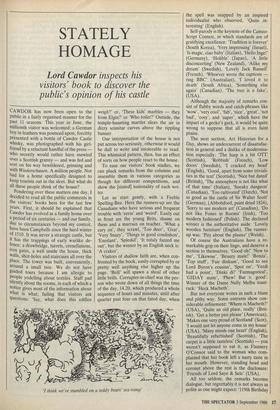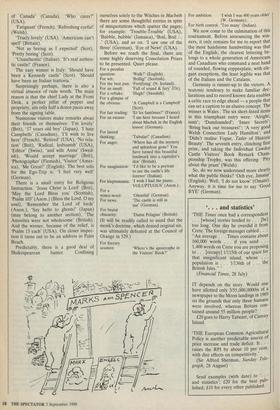STATELY HOMAGE
Lord Cawdor inspects his
visitors' book to discover the public's opinion of his castle
CAWDOR has now been open to the public in a fairly organised manner for the past 11 seasons. This year in June, the millionth visitor was welcomed: a German boy in leathers was pounced upon, forcibly presented with a bottle of Cawdor Castle whisky, was photographed with his girl- friend by a reluctant handful of the press— who secretly would rather have mewled over a Scottish granny — and was fed and sent on his way bewildered, grinning and with Wiederschauen. A million people. Not bad for a home specifically designed to keep tourists out in the sleet. But what do all these people think of the house? Pondering over these matters one day, I decided to read all the public comments in the visitors' books here for the last few years. First, it should be explained that Cawdor has evolved as a family home over a period of six centuries — and our family, due to circumstances beyond my control, have been Campbells since the hard winter of 1510. It was never a strategic castle, but it has the trappings of early warlike de- fence: a drawbridge, turrets, crenellations, iron gates, a well inside the house, thick walls, shot-holes and staircases all over the place. The tower was built, conveniently, around a small tree. We do not have guided tours because I am allergic to People yodelling about textiles. Staff pad silently about the rooms, in each of which a notice gives most of the information about what is what• failing that visitors ask questions: 'Say, what does this edifice weigh?' or, 'These kids' marbles — they from Elgin?' or 'Who toilet?' Outside, the temple-haunting martlet slices the air in dizzy scimitar curves above the rippling banner.
Our interpretation of the house is not put across too seriously, otherwise it would be dull to write and intolerable to read. This whimsical pattern, then, has an effect of sorts on how people react to the house.
To ease our visitors' book studies, we can pluck remarks from the columns and assemble them in various categories as though for different competitions, and show the [stated] nationality of each wri- ter.
Let us start gently, with a Feeble Spelling-Bee. Here the runners-up are the Canadians who have serious and frequent trouble with 'eerie' and 'weird'. Easily out in front are the young Brits, shame on them and a murrain on teacher. 'What a cary on', they scrawl, 'Too deer', `Graf', 'Very Snazy', 'Things in good condishon', `Exerlane, `Spledid', 'It totaly fazzed me out', but the winner by an English neck is: 'A craker'.
Visitors of shallow faith are, when con- fronted by the book, easily corrupted by or pretty well anything else higher up the page. 'Brill' will spawn a shoal of other little brills. Corrupter-in-chief was the per- son who wrote down of all things the time of the day, 14.20, which produced a whole sequence of hours and minutes, until after quarter past four on that fated day, when
'1 think we've stumbled on a teddy bears' sex-romp'
the spell was snapped by an inspired individualist who observed, 'Quite in- teresting' (English).
Self-parody is the keynote of the Cameo- Script Contest, in which standards are of gratifying excellence: 'Tradition is forever' (South Korea), 'Very impressing' (Israel), 'Is magic, ciao baby' (Italian), 'Hello Inge!' (Germany), 'Holible' (Japan), 'A little disconcerting' (New Zealand), 'Alike my dream' (Swedish), 'Lovely Jack Russell' (French), 'Whoever wrote the captions ring BBC' (Australian), 'I loved it to death' (South Africa), 'Something else again' (Canadian), 'The tree is a fake', (USA).
Although the majority of remarks con- sist of flabby words and catch-phrases like 'wow', 'very cool', 'fab', 'nice', 'great', 'not bad', 'cosy', and 'super', which have the impact of a gecko's gurk, it would be quite wrong to suppose that all is even faint praise.
The next section, Art Historian for a Day, shows an undercurrent of dissatisfac- tion in general and a dislike of modernisa- tion especially: 'The harp is a bit OTT' (Scottish), `Robbish' (French), 'Low doors' (Swedish), 'I cracked my head' (English), 'Good, apart from some triviali- ties in the text' (Scottish), 'Nice but dated' (British), 'The atmosphere is not like what of that time' (Italian), 'Sneaky dungeon' (Canadian), 'Too cultivated' (Dutch), 'Not as good as the castle of Sir Walter Scott' (German), (Abbotsford, paint dried 1824), 'Sorry to see modern art' (Canadian), 'Do not like Fones in Rooms' (Irish), 'Too modern fashioned' (Polish). The declared winner is the authoritative aside: 'Lovely wooden furniture' (English). The runner- up was: 'Pity about the plaster' (Welsh).
Of course the Australians have a re- markable grip on their lingo, and deserve a section to themselves: 'Good oh!' New to me', 'Likewise', 'Beauty mate!"Bonza', 'Top stuff, 'Fair dinkum', 'Good to see Lord Byron's cousins', 'Spot on', 'Verdi had a point', `Dinki di!"Fazmagorical', 'GIDAY mate', 'Phew! But v. good'. Winner of the Dame Nelly Melba toast- rack: 'Heck Macbeth'.
But not everyone writes in such a blunt and pithy way. Some entrants show con- siderable refinement: 'Where is Macbeth?' (USA), 'Quite an old place, really' (Brit- ish), 'Get a better pen please' (American), `Makes one very proud of Scotland' (Scot), 'I would not let anyone come in my house' (USA), 'Many minds one heart' (English), 'Beautifully refurbished' (Scottish), 'The carpet is a little tasteless' (Scottish) — you weren't supposed to eat it, as Flannery O'Connor said to the woman who com- plained that her book left a nasty taste in her mouth. However, standing head and coronet above the rest is the disclosure: `Friends of Lord Saye & Sele' (USA).
All too seldom, the remarks become dialogue, but regrettably it is not always as polite as one might expect: '119th Birthday of Canada' (Canada). 'Who cares?' (USA).
'Fatiguant' (French). 'Refreshing eyeful! (Welsh).
'Truely lovely' (USA). 'Americans can't spell' (Britain).
'Not as boring as I expected' (Scot). 'Pretty boring' (Scot).
'Unauthentic' (Italian). 'It's real authen- tic castle!' (France).
The easy winner is Italy: 'Should have been a Kennedy castle' (Scot). 'Should have been an Italian trattoria.'
Surprisingly perhaps, there is also a virtual absence of rude words. The main reason is that the chief Lady at the Front Desk, a perfect pillar of pepper and propriety, sits only half a dozen paces away from the signing table.
Numerous visitors make remarks about their friends or themselves: 'I'm lovely' (Brit), '17 years old boy' (Japan), 'I hate Campbells' (Canadian), 'I'll wish to live here' (French), 'Retired' (USA), `No rela- tion' (Brit), 'Radical, lesbianish' (USA), 'Editor' (Swiss), 'and wife Anna' (Swed- ish), 'Would accept marriage' (Brit), 'Photographer' (Flemish), 'Visitor' (Amer- ica), `Me Great!' (English). The best solo for the Ego-Trip is: 'I feel very well' (German).
There is a small entry for Religious Instruction. 'Jesus Christ is Lord' (Brit), 'May the Lord Bless you' (Scottish), 'Psalm 103' (Anon.) (Bless the Lord, 0 my soul), 'Remember the Lord of lords' (Anon.), 'Say hello to ghosts!' (Japan) (may belong to another section), 'The Amorites were not wholesome' (British). And the winner, because of the relief, is 'Psalm 13 each' (USA). On closer inspec- tion it turns out to be an address in Palm Beach.
Predictably, there is a good deal of Shakespearean banter. Confining
ourselves solely to the Witches in Macbeth there are some thoughtful entries in spite of misquotations which spatter the pages; for example: 'Trouble-Trouble' (USA), 'Bubble, bubble' (Jamaica), 'Boil, Boil . . .' (USA), and so on. 'I saw one of the three' (German), 'Eye of Newt' (USA).
Before we reach the final, there are some highly deserving Consolation Prizes to be presented. Quiet please.
For a peculiar
question: 'Walk?' (English).
For wit: 'Brillig!' (Scottish).
For the best pun: 'Fortifying' (N. Ireland).
For an insult: 'Full of sound & fury' (Oz).
For a rebuke: 'Hugh!' (Swedish).
For a glimpse of the obvious: 'A Campbell is a Campbell' (Scot).
For fair trading: 'Et les fantomes?' (France).
For an excuse: 'I am here because I heard about Macbek in the English lesson' (German).
'Tubular!' (Canadian). 'Where has all the mystery and splendour gone? You have turned this beautiful landmark into a capitalist's den' (British).
`I'd like to be a portrait to see the castle's life forever' (Italian).
'I wish I had the piano. VOLUPTUOUS' (Anon.).
`Ghostfur (German). 'The castle is still in use' (German).
For brutal obscurity: 'Damn Pelagius' (British).
(It will be readily called to mind that the monk's doctrine, which denied original sin, was ultimately defeated at the Council of Orange in 529.)
For literary acumen: 'Where's the apostrophe in the Visitors' Book?' For lateral thinking: For anger: For imagination: For kleptomania: For a nonce-word: For news: For ambition: 'I wish I was 400 years older' (W. Germany).
For birth control: 'Too many' (Indian).
We now come to the culmination of this tournament. Before announcing the win- ners, it only remains for me to report that the most handsome handwriting was that of the English; the clearest lettering be- longs to a whole generation of Americans and Canadians who command a neat hand of rounded, flowing copperplate; with ele- gant exceptions, the least legible was that of the Italians and the Catalans.
Germany is runner-up to the victors. A teutonic tendency to make familiar dec- larations and to record known data enables a celtic race to edge ahead — a people that can set a caption to an elusive concept. The winner is Wales . The six short-listed items in this triumphant entry were: 'Alright, innit'; `Dumfounded'; 'Inner Secrets'; `Bring back our treasures!'; 'A very good Welsh Connection Lady Hamilton'; and `Didn't realise Vogue, Tatler of Historic Beauty'. The seventh entry, clinching first prize, and taking the Individual Cawdor Castle Visitors' Book Remark Cham- pionship Trophy, was this offering: Pity about the pram' (Welsh).
So, do we now understand more clearly what the public thinks? 'Och eye, Jimmie (English). Well, 'I do not know' (Omani). Anyway, it is time for me to say 'Good BYE' (German).











































 Previous page
Previous page